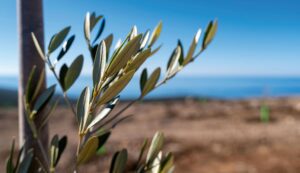Ana Radinović, Executive Director of “Čelebić Agrar” Ltd
In an interview with “Diplomacy & Commerce Montenegro”, Ana Radinović, the executive director of “Čelebić Agrar” Ltd, discusses how her company implements innovative and sustainable practices in the agricultural sector. Radinović emphasized the significance of adhering to international standards in environmental protection, embracing technological advancements in agriculture, and underscoring the vital role of agricultural producers in addressing global challenges like food safety and sustainability. Our conversation also delved into the pivotal projects undertaken by “Čelebić Agrar”, notably the cultivation of 37,000 olive trees in the Municipality of Kotor, along with forthcoming initiatives to enhance the digitization and automation of production processes.

Mrs. Radinović, one of your company’s priorities is implementing international standards in food production and environmental protection. How does our company ensure the integration of industry standards, and what specific measures do you implement to ensure sustainable production and preserve biodiversity in the areas where you operate?
“Čelebić Agrar” commenced operations in 2018 with the initiation of an olive grove cultivation project. This endeavor was initiated after the signing of a lease agreement with the Government of Montenegro for the Vranovići site in the Municipality of Kotor, encompassing a total area of 156 hectares. The comprehensive investment program includes the cultivation of 37,000 olive trees across 125 hectares, alongside the establishment of an olive oil production facility. The projected investment outlay stands at approximately €8,000,000, with approximately €4,500,000 already disbursed. The primary objective of this initiative is the reclamation of land previously ravaged by fires, transforming it into a productive agricultural expanse.
In 2021, the project successfully completed its first phase, encompassing the planting of approximately 13,000 olive trees, installation of advanced irrigation and fertigation systems, drilling of wells for irrigation, construction of an artificial water reservoir, and development of internal roads. The second phase, completed in 2023, saw the addition of 8,000 olive trees and an upgrade to the irrigation system. The upcoming third phase aims to finalize the olive grove by planting the remaining trees and enhancing the irrigation system. Notably, the olive trees are of the Picual variety from Spain, constituting 80% of the total assortment. This marks the first instance of cultivating the Picual variety in Montenegro, renowned for its piquancy and bitterness, both highly regarded in the organoleptic assessment of olive oil. Alongside the Picual variety, our olive grove features a diverse range of other planted varieties such as Arbequina, Manzanillo Sevillano, and Carlesca. This intentional variety contributes to the richness and diversity of our olive grove, ensuring a robust and well-rounded harvest.
As we approach the final phase of the olive grove project, we are proud to announce that it will encompass 125 hectares of picturesque, undulating terrain. Our commitment to conserving the surrounding natural environment remains unwavering, as we aim to safeguard the rich diversity of flora and fauna indigenous to this region. The presence of partridges, wild rabbits, jackals, and an array of avian species within our plantation attests to the vibrant ecosystem we are nurturing. Furthermore, the remarkable variety of flora further underscores our dedication to preserving the natural habitat. Our profound reverence for nature compels us to maintain its pristine surroundings, fostering its unhindered growth and flourishing.
As mentioned before, we are in the process of establishing an olive oil production facility on the plantation. The design phase for this facility has been successfully concluded, and we are now setting our sights on its construction over the next two years. From the outset of the facility’s planning, we have remained steadfast in our commitment to adhering to international standards for food production and environmental preservation, which form the cornerstone of our business. This commitment extends to our adherence to stringent building standards, where we will rigorously uphold best manufacturing practices to guarantee quality and sustainability at every phase of the process. We prioritize compliance with relevant international standards, such as ISO 14001 for environmental protection management and GlobalGAP for good agricultural practices. Adhering to these standards enables us to uphold environmental regulations and maintain high-quality standards throughout our production process. Our focus lies in strategically planning and implementing production technologies that minimize water and energy consumption, as well as effectively utilizing waste from the olive oil production process. To achieve this, we are committed to partially processing olive pomace, the primary by-product of olive oil production. This includes extracting the stone, which possesses high energy value and can be utilized as a fuel for biomass stoves. This approach will enable us to further reduce waste and maximize all available resources, thereby contributing to the sustainability and efficiency of the entire production process.
Since the olives are still young (up to 5 years old), our business is currently focused on the proper growth and development of olive trees for future production and maintenance of olive groves. In the context of sustainability and preservation of soil and plant health, we strive to minimize the use of pesticides and other agents, using them only when absolutely necessary.
Hence, our primary focus and core company policy revolve around implementing a circular and ecological business model. Our goal is to establish a sustainable business framework that reduces waste and optimizes the utilization of all resources at our disposal. By doing so, we aim to play a significant role in environmental preservation while enhancing overall business efficiency.

The agricultural industry globally relies more and more on innovations such as smart agriculture, automation, and digitization. Does “Čelebić Agrar” plan to introduce these technologies in its projects, and how can they help in achieving higher quality and productivity?
In Montenegro, agricultural producers are increasingly acknowledging the significance of digitalization in the agricultural sector and its profound impact on operations. Over the past few years, several collaborative projects with the EU have been initiated, specifically targeting the implementation of digital solutions in agriculture. This concerted effort aims to facilitate enhanced understanding and utilization of digital technologies within the agricultural domain. Digitalization in agriculture encompasses the integration of Information and Communication Technology (ICT) solutions to drive advancements in this sector. Numerous start-up ventures and initiatives are dedicated to enhancing business operations through digital innovations, intelligent solutions, and the principles of the circular economy. These endeavors also encompass advancing digital transformation in agriculture and the food industry and implementing cutting-edge technologies for precision agriculture, among other initiatives.
“Smart agriculture” is currently being cultivated in Montenegro, leveraging digital technologies like IoT (Internet of Things), sensors, drones, and data processing to optimize production processes and enhance efficiency. These cutting-edge technologies facilitate precise plant health monitoring, resource management, and predictive analysis of requirements, thereby amplifying productivity and minimizing environmental impact.
The integration of the aforementioned agricultural innovations has the potential to significantly enhance our company’s standing in the global market, particularly in light of ongoing modernization trends. These cutting-edge technologies not only bolster productivity but also drive down waste and operational expenses, essential components for maintaining competitiveness and driving business growth. Presently, we are spearheading a modest initiative aimed at automating the plantation’s irrigation system, thereby facilitating seamless, automated oversight of the irrigation and nourishment processes for our olive crops. The existing system lacks support for these functionalities; thus, our planned enhancements will pave the way for more efficient and precise resource management.
We acknowledge the global shift towards digitization and modernization of processes and are committed to staying abreast of the latest market developments. In our long-term strategy, we recognize the imperative of embracing digitization and other innovative solutions tailored to the specific requirements of our plantation. These advancements are poised to significantly enhance production processes and plantation monitoring, thereby ensuring heightened efficiency and work quality.

Agriculture is a critical sector that plays a multifaceted role in the development of Montenegro’s society and economy. Its economic significance is evident in its substantial contribution to the country’s GDP, accounting for over 7.6%. In your assessment, to what degree do you believe the interests of agricultural producers are adequately represented in this year’s Agricultural Budget? Does the state sufficiently stimulate the development of this strategic branch of its economy?
Agriculture in Montenegro plays a central and economic development role in social development. Its key contribution to the GDP has the potential to be significantly higher. Therefore, it is necessary to approach it with appropriate seriousness and commitment.
Montenegro offers substantial support to agricultural producers through non-refundable subsidies provided by the Agrobudget and European funds such as the IPA and IPARD programs. These subsidies cover a percentage of the total investment value, fostering the development and modernization of the agricultural sector. They facilitate access to funds aimed at enhancing production. To encourage the participation of young people in agricultural production, additional subsidies have been introduced for young farmers through specific measures.
Although the Agrobudget is diverse and covers all branches of agricultural production, increasing the budget for it can greatly improve it. It is the state that should additionally recognize the importance of agriculture for our country and lay the foundations for the development of this strategic branch, stimulating agricultural producers.
Agricultural producers understand the inherent challenges of engaging in agriculture, organizing production, and ensuring a consistent income, which can be frequently disrupted by unfavorable weather conditions and various other factors. For instance, in the olive growing industry, certain years may yield better results than others, while occasionally, a year may bring minimal income. This scenario underscores the necessity for government support and the development of initiatives to incentivize and bolster farmers’ commitment to this vital sector of the economy.
Given its diversity, I believe that many agricultural producers respond to calls through the Agricultural Budget published by the Ministry of Agriculture, Forestry and Water Management, but a certain number fail to take advantage of this opportunity for various reasons.
As per the available information, numerous producers emphasize challenges such as the rigorous administrative procedures for accessing funds, inflexibility of administration, the necessity to educate fund users, and issues pertaining to initial capital for farming. Addressing these challenges may serve as a starting point for strategic planning within these sectors of the economy.
In recent years, UN reports show that the world’s food crisis is growing. Almost 30% of the world’s population does not have constant access to food. In the context of this global challenge, how do you see the role of agricultural producers in ensuring sustainable and safe food production?
Food security and food safety are two distinct concepts. Food security always pertains to the consistent availability of an adequate food supply for all individuals. It is imperative to ensure that everyone has access to enough food to maintain a healthy and active lifestyle. The primary focus is on the fair distribution of food and addressing issues related to poverty and food systems. Regrettably, there is a significant global disparity – while certain nations produce excessive amounts of food, leading to wastage, others struggle to fulfill the basic nutritional requirements of their populace. Surplus food produced globally could be redirected from surplus countries to food-deficient ones, with better organization and more efficient redistribution, helping to meet food needs in poorer regions. Indeed, in addition to ensuring the provision of safe food, it is imperative to prioritize its safety by minimizing the risk of contamination at all stages of production. This necessitates strict adherence to international food quality and safety standards, which serve to safeguard consumer health and maintain trust in the food system.
Agricultural producers play a crucial role in ensuring the safety of food production. Their primary challenge lies in meeting the demands of a rapidly growing global population while minimizing adverse environmental effects. This necessitates a commitment to sustainable production, characterized by ongoing investment in technological innovation and the implementation of modern, resource-efficient technologies. Emphasizing waste reduction and heightened productivity, these measures are indispensable in striving for increased food production while concurrently reducing resource consumption, ultimately contributing to the alleviation of world hunger.
Every country should actively promote domestic production to fulfill its internal demands. This approach will minimize reliance on food imports and enhance supply security. The pivotal role of agricultural producers, in collaboration with governmental support and international entities, is paramount in combating the worldwide food crisis. Implementation of sustainable practices and responsible resource management are integral components of strategies aimed at addressing this issue.